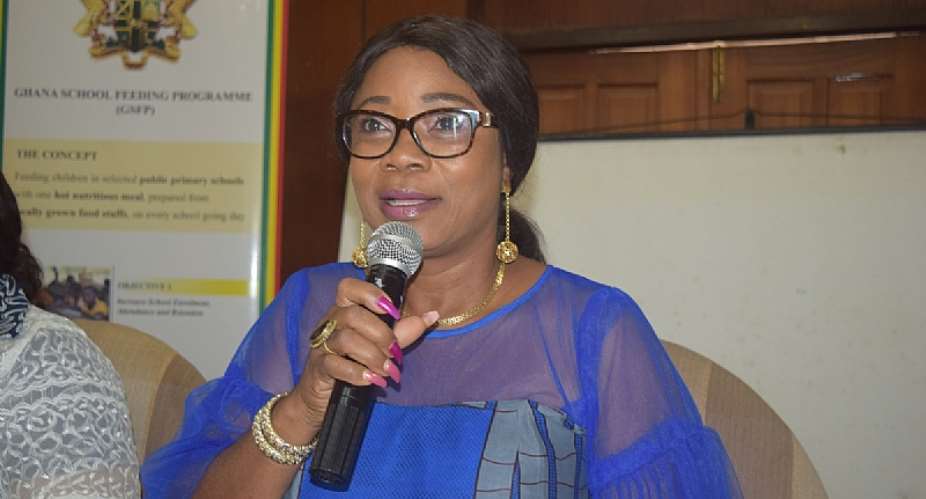The Minister for Gender, Children and Social Protection, Mrs. Cynthia Mamle Morrison has passionately appealed to communities, the private sector and district assemblies to assist schools benefiting from the Ghana School Feeding Programme in their localities with kitchen or/and dinning spaces.
Caterers of school feeding programme are compelled to cook or store their foodstuffs in undeserving and unhygienic environment following the failure by district assemblies and community members to support the beneficiary schools to put up kitchens for the caterers.
Mrs. Morrison completely discouraged the current practice where caterers out of their meager feeding grants [GhC1.00 per a child) are those putting up cooking spaces [kitchen] for their operations in some of the schools.
Speaking at a stakeholders’ workshop to disseminate the findings of the Cost Benefit Analysis on the Ghana School Feeding Programme at Kumasi in the Ashanti, the Minister expressed the fear that those caterers who put up their own kitchens and dining spaces for schools could easily pull the structures down when authorities decide to terminate their contracts in future for nonperformance or misbehaviour.
According to Mrs. Morrison, the School feeding programme will continue to be saddled with several challenges, if beneficiary communities and Ghanaians fail to play active roles in supporting the Government in its implementation.
The Acting National Coordinator of the GSFP, Mrs. Gertrude Quashigah said the vision for the establishment of the School Feeding Programme is still on course, and added her voice to the call by the sector Minister for support from the private sector, civil society organizations, communities and donor partners.
She said the Ghana School Feeding Programme is currently 100% owned by the Government of Ghana, and it requires the support of all Ghanaians especially the private sector to ensure its sustainability.
“School feeding is 14 years in Ghana. We need well-to-do parents, parent teachers associations, churches, mosques, NGOs, CSOs, individuals and agencies to voluntarily mobilize to come out to support the Programme with plastic bowls, cups, spoons, water containers, kitchen spaces, dinning tables and chairs among others so that our children can properly enjoy the programme”,
Mrs. Quashigah noted that the programme was established in 2005 to primarily increase school enrollment, attendance, and retention; reduce hunger and malnutrition and boost domestic food production among others.
She said, with the current beneficiaries of 2,566,011 pupils in 8,081 primary schools in 254 districts across Ghana; the Ghana School feeding programme has also given direct employment to 8,351 caterers.
The Acting National Coordinator therefore commended the World Food Programme (WFP) and MasterCard Foundation for collaborating with the GSFP to carry out the Cost Benefit Analysis on the programme.
The Dissemination workshop on the Cost Benefit Analysis was earlier on carried out in the Southern belt at Cape Coast for Western, Western North, Greater Accra, Central, Oti and Volta regions, Northern belt at Tamale for Savannah, Northern, North East, Upper East and Upper West before the Middle belt in Kumasi for Eastern, Bono, Ashanti, Bono East and Ahafo regions, with funding from WFP.
The Monitoring and Evaluation Director at the Ghana School Feeding Programme, Mrs. Akyere Frimpong Manu in a PowerPoint presentation of the Cost Benefit Analysis disclosed that the analysis confirmed that the GSFP delivers a strong economic value to the beneficiaries.
She indicated that every one dollar ($1.00) invested in the school feeding brings an economic return of three point three dollars ($3.3) over the lifetime of the beneficiary.
Mrs. Manu said that the findings of the GSFP Cost Benefit Analysis indicated that over the educational life cycle of the beneficiary pupil, GSFP contributes to improved education and increased productivity, providing a sustained human capital, healthier life, high enrollment and low school drop outs among others.
Other presentations on the Cost Benefit Analysis were done by Mr. John Sitor of WFP, Madam Dina Aframah Karikari, Mrs. Miriam Asare Ninepense, Mrs. Edna Apiadu and Ms Regina Lamicy Bingo all of GSFP.






 Saglemi Housing Project will not be left to rot – Kojo Oppong Nkrumah
Saglemi Housing Project will not be left to rot – Kojo Oppong Nkrumah
 Transport fares hike: GPRTU issue two-day ultimatum
Transport fares hike: GPRTU issue two-day ultimatum
 ARC endorses Alan as presidential candidate – Buaben Asamoa
ARC endorses Alan as presidential candidate – Buaben Asamoa
 Akufo-Addo appoints Kwasi Agyei as new Controller and Accountant-General
Akufo-Addo appoints Kwasi Agyei as new Controller and Accountant-General
 PNC dismiss reports of mass resignations
PNC dismiss reports of mass resignations
 PAC advocates for revenue collectors to be engaged on commission basis, not full...
PAC advocates for revenue collectors to be engaged on commission basis, not full...
 Genser Energy commissions 110km of natural gas pipeline at Anwomaso
Genser Energy commissions 110km of natural gas pipeline at Anwomaso
 Naa Torshie calls for tolerance, peace ahead of 2024 election
Naa Torshie calls for tolerance, peace ahead of 2024 election
 Asantehene commends Matthew Opoku Prempeh for conceiving GENSER Kumasi Pipeline ...
Asantehene commends Matthew Opoku Prempeh for conceiving GENSER Kumasi Pipeline ...
 Let’s do away with ‘slash and burn politics’ in Ghana — Dr Adutwum
Let’s do away with ‘slash and burn politics’ in Ghana — Dr Adutwum
